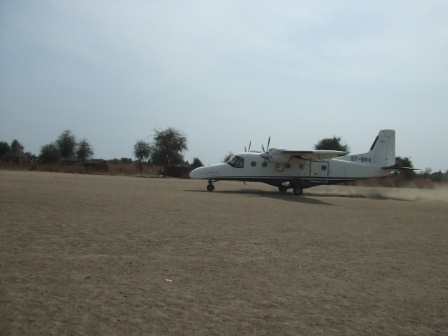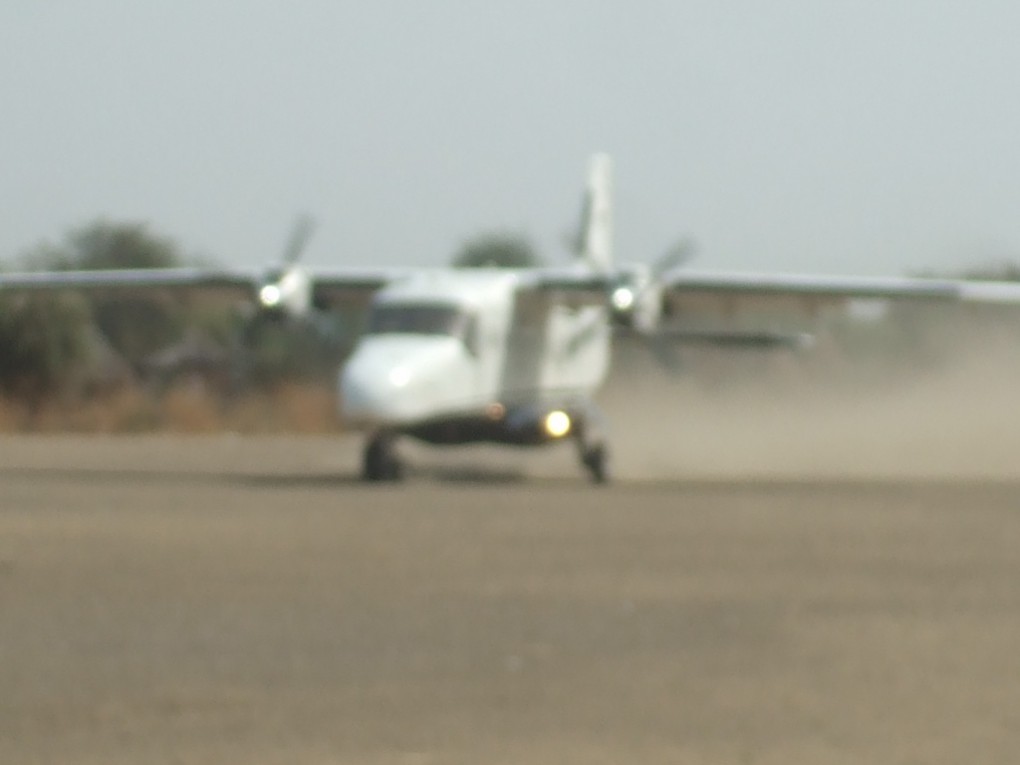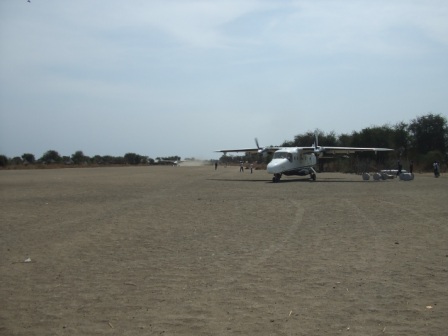OK, I think we are all agreed here: the dry season is starting. For fun, we got the thermometer out today. 110 in the shade. Nevertheless, we are still cut-off from supply by – incredibly – water! Most of my time now is taken-up with water management. Whether it be trying to get my guards to stop marauding villagers running the hospital borehole dry, or lobbying and supporting the Local Commissioner to take responsibility for the town borehole, we are the only organisation in this part of the ‘New South Sudan’ with expertise and tools to create and maintain water supply. It is deeply ironic, then, that on the one hand water is our holy grail, and in the story that follows, is our enemy.
When Laraine, the other Logistician here in Lankien was on leave, and I was in charge of all the Logistics here, I ended up requiring several Cargo plane flights. There was one day, when a truck had been sent over-optimistically from Loki with Cargo for us. In desperation, we ended-up using a bush Cargo Plane to shuttle it from the other side of the swamp to here in episodes. This is an account of it which I wrote at the time:

Cargo plane at Lankien International
…There are now four cars (Four Wheel Drive) in the village, and it feels like an invasion. We are still cut-off by truck, but I am told that supply is only a matter of weeks away. It is too risky to travel and assess the impassable part of the road ourselves, so all information is composed from local sources. Meanwhile, Aeroplanes remain our lifeline. When a plane comes, and after it has been meticulously packed with all the supplies, which first have to be ordered four months in advance, then picked from a stock across the border, then loaded according to urgency versus weight, we receive a ‘Flight Schedule’, ‘Flight Manifest’, and ‘Packing Lists’. These should correspond with what we have requested, give or take. Then, at dawn, I have to check the Airstrip, and report to our Flight Co-ordinator in Loki, who will then allow the plane to take-off. We then have to keep the airstrip clear of dogs, donkeys, cattle, random NGO equipment, and rubbish. The plane lands, we offload, check-of all the cargo, and the plane can go. In theory.

Miraculously, the dog survived.
On the first day of Dornier flights, there was a flight from an MSF plane from another project, to refuel from our stocks here. This used-up the fuel we had left – two drums of ‘JetA1’. This flight took off. Minutes later, the Dornier arrived with four new drums of fuel. These were the beginning of the stock from the stranded truck.
On the next Dornier load-up, another MSF plane had already turned-up – the scheduled regular rotation. As the Cargo unloaded, the MSF one taxied through the human faeces, shreds of old mosquito nets, piles of plastic waste, tumbleweed and dust, and over the dried-out mud, turned at the end, and started to build-up speed for take-off . It was at about 50 knots, I suppose, when my eye was caught by Riek running after one of the many wild dogs that haunt that end of the runway where they slaughter animals. The dog ran out, straight for the plane, and I have two fantastic photos of the plane, cloud of dust behind, with a dog running literally for its undercarriage. It was a heart-stopping moment. There were MSFers on board, too, but the plane was able to stop, turn, and have another go.

It is now one month since that time, and guess what: we are STILL waiting for the road. The area between us and the supply route is cut-off by swamps, and, although usually dry by now, it was ruined by some ill-advised civil engineering over rainy season, which seems to have done more harm than good. An MSF truck and trailer waits the other side of the swamp, with essential supplies – pipes to plumb the ever-growing Out-Patients Department, propane to run the Laboratory Fridge and cook, Cement to keep-up with the Latrines construction in the fight against cholera outbreaks, and Plumpynut (nutritional food supplements) for the malnourished and recovering Kala-Azar and Tuberculosis victims. This is cargo which our supply centre are reluctant to put on the planes all the way, because of its weight. It has taken two weeks to travel up from our ‘remote’ HQ at the Kenyan border.
It is always a battle of the budgets. There is a price applicable to every Kilo in weight that is brought to our project, and this ‘Transport Surcharge’ is massive. It took me a long time to be convinced to work with MSF. I had seen how Aid worked in countries like Liberia where I worked during the build-up to that infamous civil war for a different Relief Project, and it was only the fact that MSF is guaranteed to commit at least 75% of funding to field operations that made me, after 20 years of consideration, apply. But that commitment shows. There is no wastage here on the ground.
So on Tuesday, when we walked into the market in search of a place to have tea, and a huge six-wheel drive Russian Ural lorry appeared out of the dust like some kind of Out –of-Place, tattered Cold War Juggernaut, it took a moment to register first, that there was a vehicle in the market, and second, that this was the first moment of a huge opportunity.. Absent-minded for a moment, I lapsed back into traffic mode immediately and for a second carried on walking. Then it struck me. Today, this big commercial ‘Mad Max’ style truck, coming, it turned-out, with news of our MSF truck stuck in the swamps, was not to be missed, our biggest chance of supply. We are days away from running out of Diesel for the generator, and are out of propane for cooking food. Latrines will overflow before long, and it may be weeks and big bucks before we can get the stranded load ferried by cargo plane. I started running through the dust after the disappearing ragged hulk.
The driver, ‘Franco’ was friendly, and the first thing I said to myself, with unconcealed glee, was ‘He speaks English!’. I knew I had to try to make arrangements with this driver to retrieve our cargo, bit by bit, across the muddy swamps of Central Africa. But Communication across borders and deserts is painstakingly slow, and there is a list of challenges. Different accents, hell, different languages – Swahili, Arabic, Nuer and English; bad Sat-Phone reception and long-distance HF ‘Bush’ Radio. It is frustrating to know, from our supply and ordering system, that Unimogs are approved MSF standard (huge Mercedes-built ‘Go-Anywhere’ machines). I have used these Unimogs in the ‘swamps’ of West Wales, and if any project ever needed one of these, it was us.
But it is what it is. By the next evening I had managed to co-ordinate between the key players: Field HQ in Loki (Kenya/Sudan border); our Contracted Truck Company in Nairobi (Kenya); their driver at the flooded bridge over the swampland at Pathai; the 6×6 Truck owner in Bor (Sudan), and his driver here in Lankien. Payments between two transport companies across two countries had been co-ordinated, with me in the middle, and the MSF system was working like clockwork.
There is a long queue of NGO vehicles lined-up there in Pathai, waiting to come back in to South Sudan now the Referendum is over, but I persuaded him – with a bit of backslapping/handshaking, some major ‘Truck Admiration’, and a cup of tea – to do a deal with me! MSF remains the only organisation with any active presence in Lankien, so maybe this also helped to persuade all the right people to have all the right conversations with each-other. The biggest struggle was getting hold of his boss in Bor. We had to call a taxi-driver friend of his on Sat-Phone, who drove to the yard and found him. There is much more mobile phone technology than water here (although not in Lankien), but there is no electricity infrastructure in place to charge them. Landlines, of course, don’t really feature.
This is the kind of work I thrive on in the film world – making difficult things happen on film locations, finding the man who can, getting amongst the community – but I do not usually have to do it ‘blind’. All of the places I talk to are imagined to me. I have never visited them. In three months since arriving, I have not gone more than 500 metres from this compound for security reasons. So I have to guess at what is – and what isn’t – possible in these ‘Outside World’ locations around me. As I write, the truck is on its way through the bush to do what it does best. Its tyres are ragged and hissing with air, the front wheels splay apart jauntily, but it is the essence of Red Army ruggedness, and is well-capable of wrenching our MSF truck and its vital load through the mud. Spirits are high.